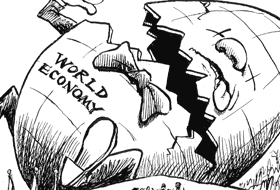 The performance of the US economy from the mid-1970s to the present was no match for its relatively robust performance during what economists call the Golden Age – 1949 to 1973. This was in fact the longest period of sustained growth in US history, when most (white) working people had achieved a degree of material security unknown earlier and unattainable since. But from the late 1960s and through the 1970s economic malaise was increasingly in evidence, signaling worse to come: high rates of both inflation and unemployment -stagflation- was not supposed to be possible in a Keynesian (1) world, but there they were, and seemingly intractable. At the same time workers’ productivity declined dramatically. Profit rates fell steadily for more than ten years as revived Japanese and European economic competitors increasingly ate into US manufacturing’s share of both world trade and the domestic market itself.
The performance of the US economy from the mid-1970s to the present was no match for its relatively robust performance during what economists call the Golden Age – 1949 to 1973. This was in fact the longest period of sustained growth in US history, when most (white) working people had achieved a degree of material security unknown earlier and unattainable since. But from the late 1960s and through the 1970s economic malaise was increasingly in evidence, signaling worse to come: high rates of both inflation and unemployment -stagflation- was not supposed to be possible in a Keynesian (1) world, but there they were, and seemingly intractable. At the same time workers’ productivity declined dramatically. Profit rates fell steadily for more than ten years as revived Japanese and European economic competitors increasingly ate into US manufacturing’s share of both world trade and the domestic market itself.Corporate and political elites responded with the cold bath treatment. “The standard of living of the average American,” pronounced Fed chairman Paul Volcker on Oct. 17, 1979, “has to decline. I don’t think you can escape that.” Interest rates went through the roof. Austerity was the order of the day, and it still is.
In 1983 an analysis of US decline and the ensuing rise of Thatcher-Reaganism appeared, in the book Beyond the Waste Land, by three Harvard-based radical economists - Sam Bowles, David M. Gordon and Thomas Weisskopf. The book received favorable reviews in many mainstream media, including The New York Times and The New York Review of Books. Reviewers included the distinguished US economists John Kenneth Galbraith, James Tobin and Kenneth Arrow.
The authors argued that a social-political factor of great importance figured crucially in the decline of US hegemony: workers had become more secure and therefore more emboldened by Keynesian New-Deal benefits like Social Security and unemployment insurance, and the labor-friendly social programs of Lyndon Johnson’s Great Society. Labor’s uppityness was especially striking in the 1960s and early 1970s. There was a notable increase in labor actions, from strikes to industrial sabotage. With fewer workers worried about where the next mouthful would come from, we saw an increase in goofing off on the job, tardiness, job-switching, pressure for improved workplace safety measures and demands for higher wages and benefits. The result was a decline in productivity (output per unit of labor input) and a wage-push profit squeeze.
Most importantly, the legacy of the New Deal and the Great Society had resulted in a shift in the distribution of national income from capital to labor.
Bowles, Gordon and Weisskopf argued that with effective unions and unprecedented security, labor had achieved a degree of power over capital hitherto unknown. This analysis has been developed more recently by the economists Jonathan Goldstein and David Kotz, who show that every Golden-Age recession was generated by a wage-push profit squeeze in the preceding expansion. According to Bowles, Gordon and Weisskopf, capital did not take this sitting down. Corporate America initiated a counteroffensive which the authors called the Great Repression. Capital’s counterattack, we may say, persists to this day.
Alan Nasser is Professor Emeritus of Political Economy at The Evergreen State College in Olympia, Washington. This article is adapted from his book in progress, The “New Normal”: Chronic Austerity and the Decline of Democracy. He can be reached at nassera@evergreen.edu

No comments:
Post a Comment